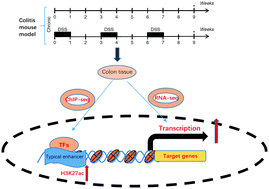Profiling of histone 3 lysine 27 acetylation reveals its role in a chronic DSS-induced colitis mouse model†
Abstract
Inflammatory bowel disease (IBD) is a chronic inflammatory condition of the gastrointestinal tract. In current dogma, pathogenesis of IBD is attributed to the dysregulated mucosal immune response to gut flora in genetically susceptible individuals, but the genetics evidence from GWAS studies so far is insufficient to explain the observed heritability in IBD. For this discordance, epigenetics has emerged to be one of the important causes. Recent studies have reported that histone acetylation is correlated with the development of IBD, whereas its role and underlying molecular mechanism in the disease still remain elusive. Here, we established a dextran sulfate sodium (DSS)-induced chronic colitis model and performed RNA-sequencing (RNA-seq) and Chromatin Immunoprecipitation followed by NGS sequencing (ChIP-seq) for H3K27ac in the mice colon tissues to investigate whether H3K27ac is involved in the development of intestinal inflammation. We found that the global H3K27ac level and distribution in colon tissue had no significant difference after DSS treatment, while H3K27ac signals were significantly enriched in the typical-enhancers of the DSS group compared with the control. By combining with RNA-seq data (fold change >2), we identified 56 candidate genes as potential target genes for H3K27ac change upon DSS treatment. We further predicted transcription factors (TFs) involved in DSS-induced colitis according to the enhancers with increased H3K27ac. H3K27ac increase in special typical-enhancers in the DSS group is possibly related to the development of intestinal inflammation by up-regulating adjacent gene expression and shifting TF networks, which will provide new insight into the pathogenesis and therapy of IBD.



 Please wait while we load your content...
Please wait while we load your content...